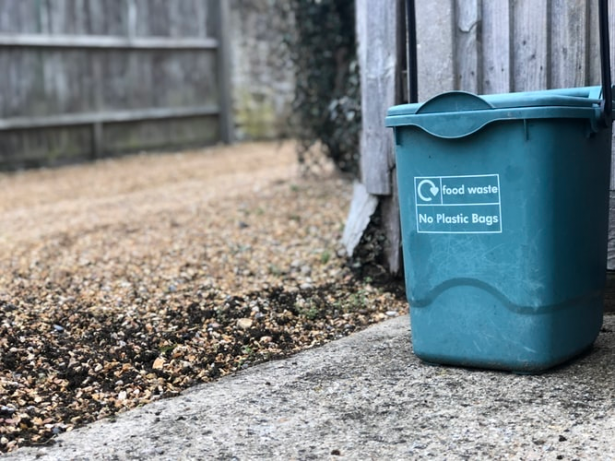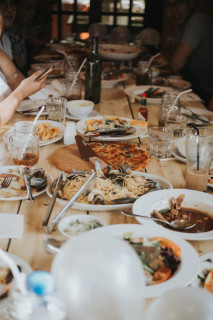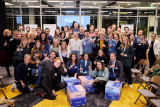In my last couple of weeks here at Amsterdam Smart City I will present this community a series of interviews on the circular economy with companies here in the Amsterdam Metropolitan Area.
In this second post I will introduce you to a company that contributes to one of the building blocks of the City of Amsterdam: to minimize food waste from retail, catering and household.
In a circular economy, food waste should be minimized to avoid the excess production of food and minimize environmental impacts. In the Netherlands we throw away around 105 kg food per capita a year. The company I present today offers a solution to this problem.
I would like to introduce you to Too Good To Go, a Danish company that started in the Netherlands in January 2018. For this interview I spoke to Sharonne. She works as public relations specialist at Too Good To Go for five months now and can tell us everything about it.
For which problem is Too Good To Go a solution and how started it?
Sharonne: 'We are an application for your mobile device and we fight food waste, by bringing people together. On our app companies such as restaurants, supermarkets, bakeries, hotels and other companies are able to sell their daily leftovers. For consumers it is possible to buy these leftovers for a reduced price on our app. On our app, consumers are able to locate companies that offer Magic Boxes and buy these for a fair price. Users of our app purchase a so called Magic Box, with a surprise of products approaching the expiration date.
Actually the concept is really easy and sometimes gives you the feeling of if only I had thought it myself. It all started in Denmark, with four friends that went to a restaurant. They saw that the restaurant had to throw away a lot of food at the end of the day, they asked themselves how they could prevent this. The students asked the restaurant manager that if they thought of something that helps to reduce their food waste if he will join them. This is how the first partnership started and how Too Good To Go was established. Meanwhile Too Good To Go is active in 13 countries and number 14 is upcoming.
We are able to expand this quick because of the win-win-win situation. At Too Good To Go there are always three different winners. Consumers that enjoy a meal for a reduced price, store owners that earn some money from things they otherwise would have thrown away and the environment. The environment is the biggest winner, by saving all meals a lot of CO2 emission is prevented.'
How does it work exactly?
Sharonne: 'If you open the application on your mobile device you get a list or a map which shows you locations that offer their daily leftovers or their excess food. If you have made your choice you can buy a Magic Box and you get a time frame in which you have to pick up the box. First it started as an initiative with stores that offered their Magic Boxes at the end of the day, but now we see that almost every time of the day the boxes are available. In the morning for example you can already pick up a Magic Box from a restaurant around closing time and in between you can see what the local juice bar or bakery offers.
The Magic Box consist of food that approach their expiration date, so the content of a box depends on the time of day, the provider of the box etc.

How do you and your partners contribute to a circular Amsterdam?
Sharonne: 'We get some of our partners indirectly through other partners who told them our app really works, or store owners read about it in the media or used our app themselves, but we also have to do some acquisition. The bigger we get the easier it is for us to show companies that our app really works against food waste and that they can earn a little money for products they would have thrown away otherwise.
We are more than an app, we are a movement against food waste. To reduce food waste it is important to raise awareness among companies. We offer them a simple and accessible solution, the more people join us the more impact we create. Per organization we look at the process, what are they already doing, and try to fit Too Good To Go in to the process. However the concept of Too Good To Go is designed in a way that a store owner can continue its working method.
Together with our partners we just saved our millionth meal in the Netherlands and we are still counting. But this is not the only way we try to contribute. We are known because of the app, but in addition we also want to raise awareness for food waste in general. This is why we launched our movement website, here you can find information and test your knowledge about food waste. But it will also provide teaching material for schools or provide entrepreneurs with political information on food waste. So we try to inspire and raise awareness among consumers and business here in the Netherlands.'
Your question for the community?
'What is your best tip to prevent food waste?'
Make sure you read my first blog here






Hi TGTG and Amsterdam Smart City,
We love what you are doing! But there is still a big challenge that brings up an important issue: Every time someone orders from you, they are preventing food waste but creating single-use packaging waste. Packaging waste is more harmful to the environment than food waste. You can prevent both when you figure out a way to switch to reusable, returnable packaging. We know this is a bit hard, but completely possible. You know where to find us. We can help. Beth Massa, Founder at Ozarka: Takeaway Without Throwing Away.